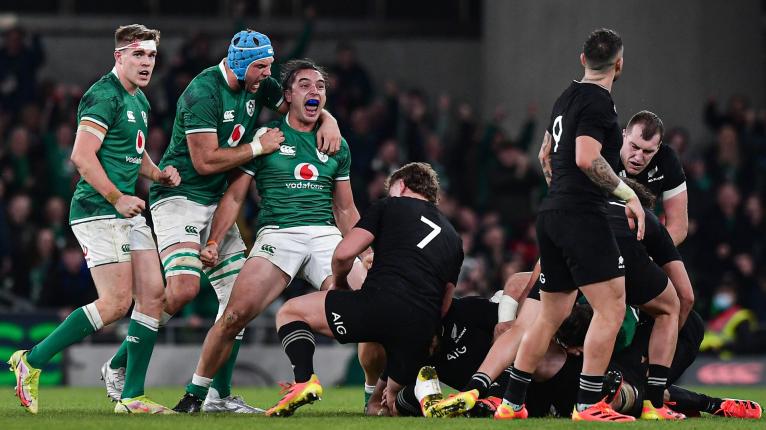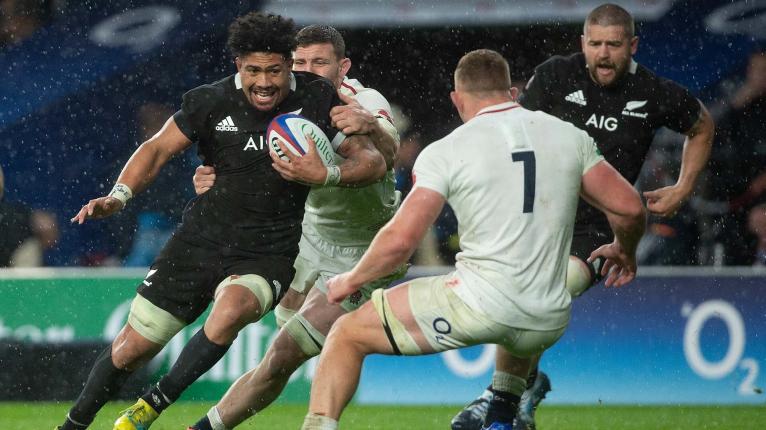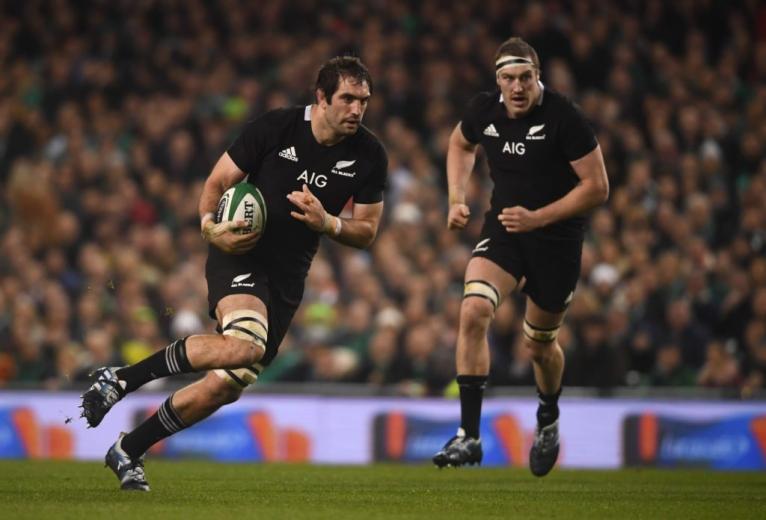In just under two months’ time, Ian Foster will name his first All Blacks squad of the season ahead of the team’s three-match series with an Irish side chasing their first-ever win on New Zealand soil.
Given the events of last year, there will be three key targets Foster will be striving for in 2022.
The first will be to whitewash Ireland.

Make no mistake, Andy Farrell’s side is a fearsome beast. After scoring another win over the All Blacks last November, they recorded four strong wins in the Six Nations to finish second on the ladder and this July looms as perhaps their greatest ever chance at scoring a rare victory in NZ.
But while Ireland and the All Blacks might be evenly matched at present – and some would even quite reasonably suggest that the Irish are the stronger team – there’s a certain hoodoo about taking on the men in black on their home turf.
With the All Blacks conceding historic defeats to Ireland and Argentina in recent seasons, Foster will be looking to score three victories in Auckland, Dunedin and Wellington come July – even if the odds might suggest that one win for the travelling side is a very reasonable expectation.
The second (and more difficult) task will be retaining the Rugby Championship trophy. The format change this season will see the All Blacks play two home matches against Argentina, one home and one away against Australia, and two away games against South Africa. That’s an incredibly tough schedule with the two easiest games played in NZ and the two most difficult games played amongst a braying cauldron of Springboks fans – including one at altitude.
With the Bledisloe Cup series restricted to two games this season (the first of which is in Australia), it could be an incredibly confident and inspired Wallabies team that the All Blacks come up against at the MCG on September 17.
Just once throughout history – back in 1996 – have the All Blacks managed to bank two wins against South Africa in their home nation and given the lack of consistency we’ve seen from the team over the past two years, it would be a major accomplishment if Foster’s men could achieve it the feat in 2022.
The Wallabies also won’t be easy beats in Australia – especially given the two games between the trans-Tasman rivals won’t take place until the final weeks of the competition, when Australia could be riding high following a kinder schedule that will see them take on the Springboks twice in Australia. The Wallabies achieved a whitewash at home over the Springboks last year and will be expecting similar results in 2022.
With the Bledisloe Cup series restricted to two games this season (the first of which is in Australia), it could be an incredibly confident and inspired Wallabies team that the All Blacks come up against at the MCG on September 17.
Still, a Rugby Championship title should be expected – as it is every year for the All Blacks.
That leaves one final task for Foster’s men: restoring some respect in Europe.

The three sides that topped the Six Nations table this year, France, Ireland and England, would all be confident heading into a World Cup match with the All Blacks that they could take down the once-behemoths of the game. Even the ever-plucky Scotland, in the right conditions, would probably fancy their chances at present. That’s no surprise, given the dismal tour embarked on by NZ last year that saw the team score just two wins in Europe – against (an understrength) Wales and Italy.
This year, the All Blacks are set to take on Wales, England, Scotland and likely one of Ireland, Italy or Japan when they head north in November. Anything fewer than three wins would be a disappointment while four would probably be necessary to instil New Zealand as second-favourites behind France to triumph at next year’s Rugby World Cup.
Of course, that’s the primary goal for Ian Foster: success in 2023.
If Foster can bring home a World Cup, many of the disappointments of his first two years in charge will be somewhat forgotten.
That creates a complex juggling act for the All Blacks head coach because the players best charged with producing wins this season might not be the men most capable of achieving glory on rugby’s highest stage the next.
Even in the positions where the All Blacks have depth, however, there will be some concern. Men like Sam Whitelock, Brodie Retallick, Codie Taylor and Nepo Laulala are not the players they were in 2015 – they’re not even the players they were a few years ago, when they were at various times outperformed by their South African, Irish and English opposition.
Can a World Cup-winning squad be selected from the 43 men that took the field in the black jersey last year?
There are some areas where the All Blacks are suitably stocked and the biggest challenge will be whittling down the competition. At hooker, lock, in the loose forwards, halfback, first five and the outside backs, there’s an ample supply of players who should be capable of footing it with the best, even if they themselves are not the best in the business. At prop and in the centres, however, new blood might be necessary for success in 2023.
Even in the positions where the All Blacks have depth, however, there will be some concern. Men like Sam Whitelock, Brodie Retallick, Codie Taylor and Nepo Laulala are not the players they were in 2015 – they’re not even the players they were a few years ago, when they were at various times outperformed by their South African, Irish and English opposition.
It could well be that the older players in the squad simply need a bit of time out from the test arena in order to mentally and physically freshen up ahead of the 2023 tournament. But maybe the issue isn’t form – maybe the issue is simply that they’re no longer titans of the game and have been eclipsed by the men around them.

Either way, with Foster trimming his squad down to 36 and fewer than 20 tests on the agenda between now and the opening game of the Rugby World Cup – where the All Blacks will be at risk of shedding their claim as the only side undefeated in the pool stages of the showpiece tournament – now is the time for Foster to be brave.
Yes, it’s important to take the wins this year, but perhaps men like Fletcher Newell, Tamaiti Williams, Ollie Norris, Ethan de Groot, Josh Lord, Tupou Vaa’i, Thomas Umaga-Jensen and Leicester Fainga’anuku are the kinds of players that can rise to the occasion in 2022 and then enter next season as young, fresh and at least slightly experience players who can help carry New Zealand to a World Cup title.
That doesn’t just mean selecting them in the wider squad, either, it means giving them regular opportunities to prove their value and grow their game on the pitch.
If those players don’t make the grade this year then Foster can always revert to the tried and true in 2023, but the likes of Newell and Lord need more than just a handful of minutes against lesser opposition to grow into genuine test players and time is running out.
The rhetoric from last year suggests that Ian Foster and his fellow selectors were relatively content with much of how 2021 progressed – it was, after all, an incredibly long season. But if, perchance, it does turn out that the men who have been mainstays in the environment for the better part of the last decade aren’t the best men for the job then it will be too late next year to right the ship. Now is the time for the All Blacks to be brave – and that starts at the selection table.
A ‘brave’ 36-man All Blacks squad (including injured players):
Props – Alex Hodgman, Ethan de Groot, Tamaiti Williams/Fletcher Newell, Ofa Tuungafasi, Nepo Laulala, Tyrel Lomax
Hookers – Samisoni Tauke’iaho, Asafo Aumua, Codie Taylor
Locks – Brodie Retallick, Josh Lord, Tupou Vaa’i, Scott Barrett
Loose forwards – Sam Cane, Ardie Savea, Ethan Blackadder, Luke Jacobson, Akira Ioane, Dalton Papalii, Hoskins Sotutu
Halfbacks – Aaron Smith, Finlay Christie, Cortez Ratima/Folau Fakatava
First fives – Beauden Barrett, Richie Mo’unga
Centres – Anton Lienert-Brown, Jack Goodhue, David Havili, Rieko Ioane, Thomas Umaga-Jensen/Quinn Tupaea, Roger Tuivasa-Sheck
Outside backs – Caleb Clarke, Sevu Reece, Leicester Fainga’anuku, Will Jordan, Jordie Barrett


Interesting article.
Combinations must be a precedent this year.
Learning from previous world cups experience matters ( Whitelock )
Missing players in my eyes Shannon Frizell and Joe Moody. Shannon been immense this year a line option, ball carrier and a great defender.
Joe his experience in facing the Boks, England and France has to be considered for WC.
I feel the squad needs influenced by the WC. More than this years games.
Your Thoughts ?
Moody is out with ACL till May 2023 and Shannon never plays the same for ABs